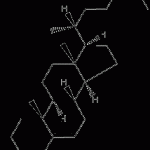
cholesterol
Very basically, activating PPAR? is generally associated with increased fat burning, increased high density lipoprotein (the “good” cholesterol), and increased lipoprotein lipase (LPL) activity, which helps reducing low density lipoprotein (the “bad” cholesterol).These effects seem to help control blood sugar also, possibly by reducing insulin resistance. This makes PPAR? very appealing as a target for anti-obesity, anti-diabetic and anti-hyperlipidemia drugs. So much so, that exciting research coming out of the Washington University School of Medicine has identified a natural ligand called 1-palmitoyl-2-oleoyl-sn-glycerol-3-phosphocholine (POPC). What is truly exciting is that this is a constituent of the naturally occurring group of phospholipids and fatty acids known as lecithin. Lecithin is found in eggs and soy beans, and is used regularly as a food additive, most notably in chocolate where it improves the texture. The researchers found that POPC was a good PPAR? in the liver, and had some very weak activity on the PPAR-beta receptor. Lecithin is not 100% POPC, but adding it to your diet may be of benefit as POPC is a derivative of phophatidylcholine, which is one of the main constituents of lecithin.
Source: Chakravarthy MV, Lodhi IJ, Yin L, Malapaka RR, Xu HE, Turk J, Semenkovich CF. Identification of a Physiologically Relevant Endogenous Ligand for PPARalpha in Liver. Cell. 2009 Jul 29.
